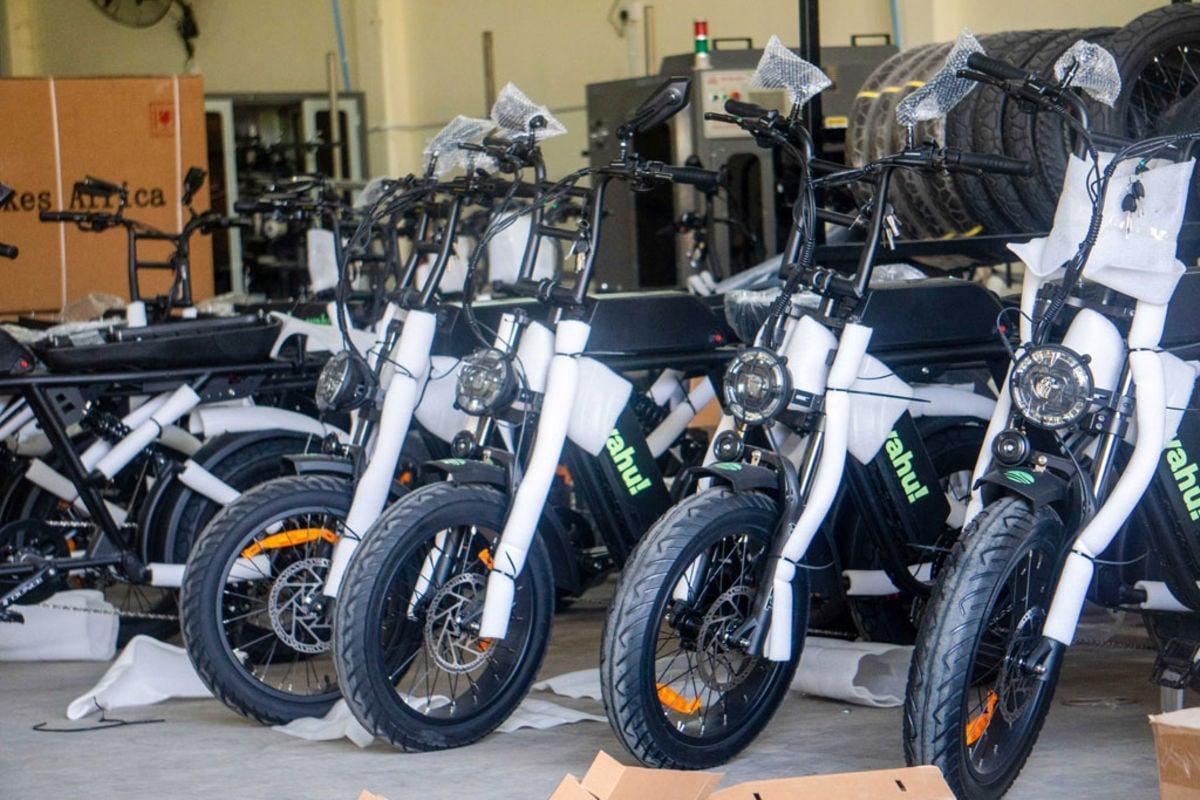Africa-Press – Botswana. It is midmorning in Accra and a group of bike riders are inspecting their motorcycles before hitting the capital city’s busy roads for the day’s deliveries, as lunchtime orders start to come in.
Lawrence Akakpo removes a battery that powers his bike from its plug, fixes it to its seat on the two-wheeler, picks up his food delivery bag and moves quickly to a pick-up point where there’s an order waiting to be delivered to a client.
He owns a Wahu bike — an electric-powered motorcycle that is part of a wave of electric utility vehicles impacting on job opportunities and the environment across the continent.
Unsure of where to turn to after graduating, Akakpo came across Wahu as an opportunity to earn a living. Akakpo, like the other 150 Wahu riders, owes his livelihood to the vision of Valerie Labi, co-founder and CEO of Wahu Mobility.
What started as a project in the northern part of Ghana with the converting regular motorbikes to electric bikes with the help of like-minded friends, birthed Wahu Mobility. The start-up describes itself as an Electric Vehicle (EV) company that manufactures eco-friendly motorcycles providing a reliable source of income for youth.The young rider feels he has more control of his life since powering the motorcycle requires only the turning on a switch to charge the battery instead of being at the mercy of unpredictable fuel prices. Maintenance and support from the mobility company also offers riders like him much comfort.
“I charge my batteries once a day, which takes about five to six hours, which also allows us to get some rest. It is an affordable alternative,” Akakpo said.
Adutwum Hagar Adutwumwaa, an engineer at Wahu Mobility, originally trained in marine engineering. Her curiosity led her to Wahu, where she oversees quality checks and bike assembly. Despite joining the company just six months ago, she’s already made a significant impact. “I have learnt new things. Now I make batteries from recycled lithium iron cells,” Adutwumwaa said.
Being the only woman among men, during her study internship and national service, Adutwumwaa was happy to find other female colleagues, who are also engineers at Wahu Mobility.
A ride-to-own initiative is one part of the startup’s mission. Different payment plans are available to meet the pockets of would-be drivers, taking away the worry of interested riders who cannot afford to pay up front.
The average cost per charge of the battery is $0.27. That can take a bike around 70 kilometres.Fortunately for the young start-up company, convincing traditional motor riders to switch to electric bikes has been easy because of the huge savings they make on fuel.
Every Wahu bike rider goes through special training on how to use the e-bikes before hitting the road.
“Every rider has a score system using an app to check how well they ride. The system is designed to turn off the bike when unsafe riding is detected,” Labi said.
Wahu also infuses technology initiatives into its operations. The factory where the bikes are assembled and maintained is solar powered and completely off-grid, creating energy efficiency and sustainability.
The company is extremely particular about the impact of the business on the climate. The bikes are tracked to measure their environmental impact with every kilometere driven helping to prevent carbon emissions.
The environmental impact of the EV economy is getting national attention in Ghana, with institutions like the country’s Environmental Protection Agency (EPA) and the Ministry of Transport leading the charge.
Amoah emphasised that the EV industry offers vast opportunities beyond job creation, with the EPA working to promote investment in the sector.
“Some investors can focus on transport systems such as uber, taxis, delivery services using EVs. We offer guidance and advice on the understanding of the implications of such an investment in terms of laws, market appetite and others. We also work with other sister institutions such as the Ministry of Transport and Energy among others to cross-fertilise our ideas.”
Partnership was the major breakthrough for Labi when she partnered with like-minded people to establish Wahu Mobility. Localisation was key, with Wahu aiming for a significant local content in each bike.
“At least 85 percent every EV can be produced locally in Ghana or ECOWAS or Africa,” the co-founder said.
“We started with off-the-shelf-vehicles-to-digital conversions. We’ve worked all the way to the factory that we have and we have an over 24-month program underway for localization components,” she said.
However, even though the Ministry of Transport adopted an EV policy in December 2023 to support the sector and address global warming, young companies like Wahu do not qualify for the incentives. Labi also expressed disappointment at the lack of regulatory measures for innovations in product development in the automotive industry.
The policy includes a waiver of import duties on EVs designated for public transport and certified assembly companies will also enjoy tax exemptions on semi-knocked and completely knocked down EVs for eight years starting in 2024 and an extension of Value Added Tax exemptions on locally assembled vehicles for two more years.
Currently, Ghana has some 17,000 two, three and four-wheel registered EVs, according to the Minister of Energy, Mathew Opoku Prempeh.
Despite the challenges, Wahu is optimistic about its long-term goal of “turning the company into a revenue generating asset over time” and exporting to countries across Africa.
“What we see in Ghana and a lot of African countries is that there’s no support for delivery riders and that is what the company seeks to change. We recently opened our office in Lomé, Togo where most of the riders are women.”
Wahu also currently has partnerships across all universities in Ghana and through this initiative trains and recruits new staff. They hope to be the number one producer of EVs in Africa.
For More News And Analysis About Botswana Follow Africa-Press






